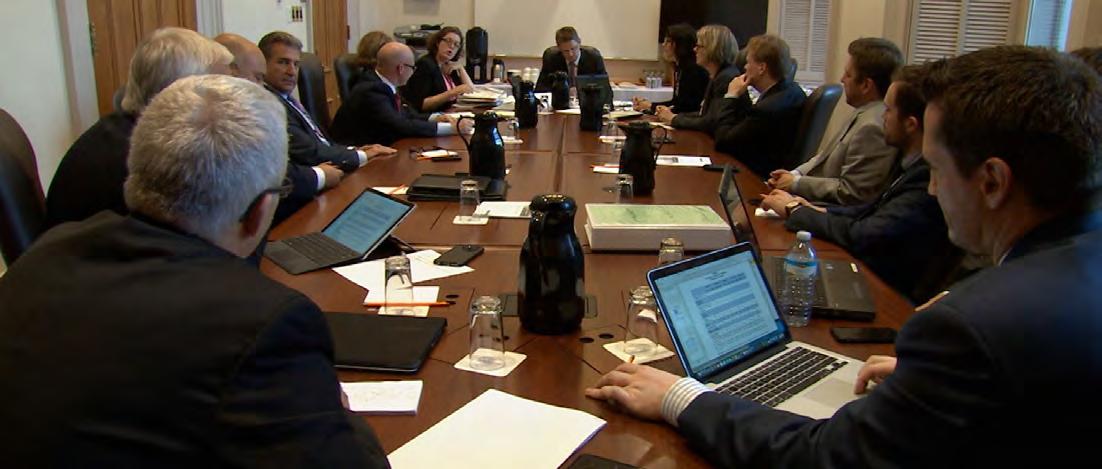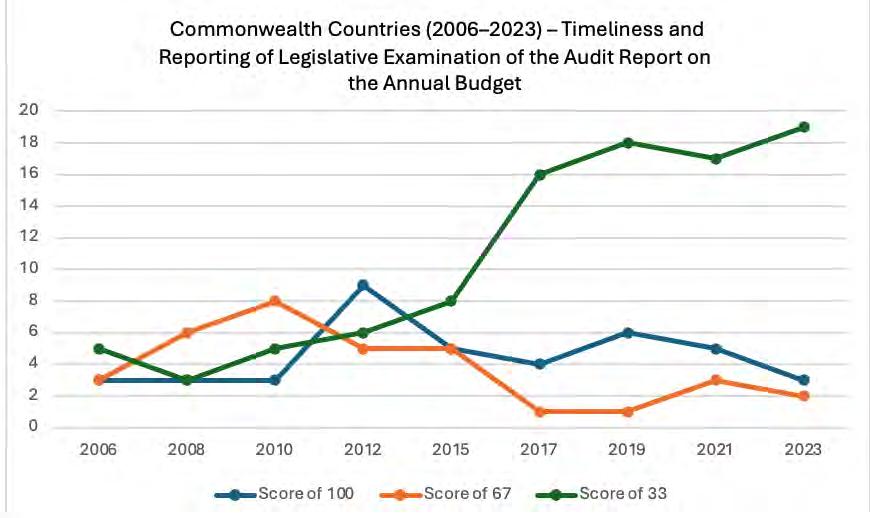
8 minute read
REINVIGORATING PUBLIC ACCOUNTS COMMITTEES
Strengthening Accountability across the Commonwealth
Geoff Dubrow is Founder and Principal Consultant at Nexus PFM Consulting, dedicated to addressing global challenges - such as the debt crisis and social inequality - through horizontal collaboration and multi-institutional solutions.
Introduction
Public Accounts Committees (PACs) are a cornerstone of democratic oversight and a vital part of the accountability chain in public financial management (PFM). Their core role - to examine the use of public resources and ensure that government expenditures align with legislative intent - is essential for fiscal transparency and integrity.
Yet across many Commonwealth jurisdictions, PACs face significant structural, political and procedural constraints that reduce their effectiveness. This article draws from lessons learned to highlight five key challenges and offers a call to action for Parliaments and stakeholders to reinvigorate PACs as a vehicle for meaningful accountability.
Five key constraints undermining PAC effectiveness
1. Overemphasis on transactional detail in an age of poly-crisis
In many countries, PACs operate as if they are still living in a world of routine fiscal missteps, focusing heavily on line-item compliance issues that are frequently repeated from one audit report to the next. While such findings must not be ignored, this transactional focus prevents PACs from addressing more strategic and systemic risks such as fiscal sustainability, public debt and the governance of state-owned enterprises. This practice also hampers the timely review of other Supreme Audit Institution (SAI) reports, including performance audit reports, as Parliamentary Committees expend disproportionate time on repetitive details rather than systematically addressing the complete set of audit findings.
Recent Open Budget Survey results reveal a troubling trend: fewer PACs are meeting the best practice of examining the SAI annual Audit Report within three months and publishing a report with findings and recommendations.
Out of the 31 Commonwealth countries assessed in the survey, the number achieving this benchmark began at three in 2008, rose to a peak of nine in 2012, and then fell back to three in 2023.1 Meanwhile, those taking more than six months or failing to publish a report rose from three in 2008 to nineteen in 2023. In many cases, delays stem from a transactional approach to audit scrutiny - focusing on individual audit transactions rather than systemic weaknesses - which consumes time, clogs Committee agendas and leaves broader audit backlogs unaddressed.
In an age of poly-crisis - where governments face converging challenges such as climate change, pandemics and rising debt - PACs need to lift their gaze. Oversight must evolve from transactional to transformational, probing how governments manage emerging risks, adapt policies in uncertain times and safeguard long-term fiscal health.
To make the shift from transactional to transformational oversight truly effective, PACs need a disciplined method for identifying which audit findings merit priority attention. This calls for clear criteria to guide the prioritization and review of findings - including current reports and considerations of materiality - ensuring that the most significant financial and governance risks receive timely and thorough scrutiny.
2. Limited coverage beyond central government
In most jurisdictions, PACs concentrate their oversight on central government agencies. This leaves a wide gap in scrutiny of sub-national governments and state-owned enterprises (SOEs), even though these entities often control large public investments and assume substantial fiscal risks.
The result is a dangerous blind spot. SOEs are frequently involved in infrastructure development, energy provision and large-scale borrowing - areas where inefficiencies and mismanagement can have significant fiscal consequences.
Some countries have addressed this by creating parallel Committees, such as Public Investment Committees or dedicated SOE oversight mechanisms. In South-East Asia and parts of East Africa, parliamentary rules define clear mandates for such SOE and local government oversight Committees. However, many West African and Caribbean Parliaments have yet to follow suit.
In the absence of broader coverage, PACs risk becoming overburdened, undermining their ability to meet public and institutional expectations for robust parliamentary oversight.
Expanding the scope of scrutiny and distributing oversight responsibilities more evenly across specialised Committees can ease pressure and improve results.
3. Weak follow-up on PAC and SAI recommendations
A Committee’s effectiveness is ultimately judged by whether its recommendations are implemented by the Executive branch. Many PACs excel at holding hearings and producing reports but the Executive branch falters when it comes to follow-up.
Between 2006 and 2023, more countries reported publicly on Executive follow-up through their SAI or Legislature than through the Executive branch itself, and such reporting has increased significantly over time. While this demonstrates political will and capacity within oversight bodies, it also underscores a gap in Executive accountability. The responsibility for implementing and reporting on audit recommendations lies with the Executive branch, and SAIs should not be expected to fill this role on their own.
Embedding clear obligations for the Executive - such as statutory Treasury Memoranda or legally mandated annual progress reports - into law and practice can ensure timely responses to PAC recommendations, strengthen follow-up and close the accountability loop.
4. Delays in plenary adoption of PAC reports
Even when PACs do their job thoroughly - holding hearings, analysing audit reports and drafting findings - political roadblocks often delay the adoption of those reports by Parliament. In systems where Treasury Memoranda or Executive responses are only triggered after plenary adoption, this delay can paralyze the entire oversight process.
In jurisdictions like Uganda, PAC reports can take months or even over a year to reach the floor for adoption - owing to backlogs and scheduling delays. In Nigeria, even after a historic success where the audit cycle was completed for the first time in 26 years, plenary proceedings went through the report clause by clause before adoption - demonstrating strong engagement but effectively repeating the Committee’s work and delaying Executive action (PLSI, Press Statement, 23 July 2025).
Parliaments should streamline adoption procedures in Standing Orders, ensuring that PAC reports are tabled promptly and brought forward in a timely, non-partisan manner. Without this, the PAC’s recommendations remain theoretical, and the cycle of accountability is broken.


5. Structural constraints in small Legislatures
Small Legislatures, such as those in many Caribbean and Pacific Island countries, face structural and political constraints that weaken PAC effectiveness. With fewer MPs and limited backbenchers, staffing is a challenge; Ministers or other Executive Members may sit on the Committee, undermining independence, while quorum can be difficult to achieve. Many operate without dedicated research or administrative support. In the Caribbean, the Leader of the Opposition often chairs the PAC - a role that can lend political weight but, when held by a former Prime Minister or defeated political leader seeking a return to power, can shift the focus from impartial scrutiny to political point scoring, eroding credibility.
In some Pacific islands, constraints are also acute. In Tuvalu, Hon. Seve Paeniu, MP, described how a three member PAC can grind to a halt if the Chair is absent, making it impossible to achieve quorum. He noted that the Committee’s rules, embedded in Standing Orders, lack sufficient ‘teeth’ to ensure regular meetings or effective follow-up. The PAC also relies heavily on the Auditor-General’s Office for both advisory and clerical support - an arrangement that blurs oversight roles and further undermines functionality.
Such constraints can render PACs ‘paper tigers’ - Committees that exist in law but lack real bite. Meetings may be sporadic, follow-up weak and reports largely ignored.
Creative solutions are needed: Parliaments could consider leveraging support from independent experts, inviting eminent members of civil society to participate as members in the hearings, or providing technical assistance through regional networks. House Leaders and Prime Ministers must also recognise PACs as allies in improving governance - not threats to be politically managed.
A call to action: Strengthening the full accountability chain
Reinvigorating PACs is not just about improving Committee procedures. It is about reimagining them as part of a broader accountability chain that includes SAIs, internal audit bodies, anti-corruption commissions, Ministries of Finance, and - most importantly the plenary of Parliament itself. This includes joining organisations such as the Commonwealth Association of Public Accounts Committees (CAPAC) and participating in peer-to-peer benchmarking activities.
A strong PAC requires political will from party leaders, support from the Speaker’s Office, and capacity investments in staff and research. Even more fundamentally, it requires a shift in mindset: from viewing oversight as a partisan threat to embracing it as a tool for institutional strengthening.
In an age of polycrisis, democratic resilience depends on transparent, effective oversight of public resources. Reinvigorating PACs is both an institutional imperative and a political necessity. Let us rise to the challenge.
Nexus PFM Consulting is dedicated to addressing global challenges through horizontal collaboration and multi-institutional solutions.
Public Financial Management expert with extensive expertise supporting Parliamentary Oversight Committees, including PACs, fostering strong linkages with SAIs, Ministries of Finance and civil society to ensure collaborative and impactful oversight. Visit https://nexuspfm.com/.

